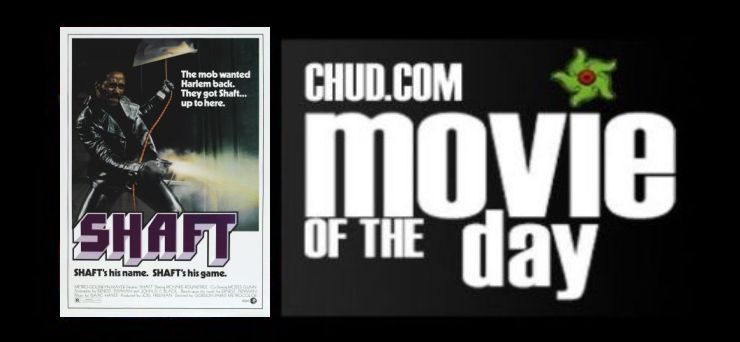
The Film: Shaft (1971)
The Principals: Director: Gordon Parks, Richard Roundtree, Moses Gunn, Drew Bundini Brown, Charles Cioffi, Christopher St. John, Gwenn Mitchell and Lawrence Pressman.
The Premise: John Shaft is a black private dick in New York who takes the case of Bumpy Jonas (Gunn), Harlem’s biggest criminal lowlife, when Bumpy’s only daughter is kidnapped. Even before Shaft and Bumpy meet, things are tense between them because Shaft had to kill one of the flunkies that Bumpy sent to collect him. This has also caused Shaft no end of headaches with the cops and his friend, Lt. Vic Androzzi (Cioffi). Shaft soon discovers, however, that he’s in for way more than he bargained when a lead onto which Bumpy put him, Shaft’s former friend in the Movement, Ben Buford (St. John) is a key player in a plan that Bumpy has to deal with an oncoming gang war. It’s a war in which Shaft finds himself squarely in the middle.
Is It Any Good: It’s iconic, young blood. Shaft helped usher in the blaxploitation genre of the 1970s and presented arguably the smoothest and sexiest black hero in film history, upon whom many subsequent characters – including a certain eponymous ebon TNT – were patterned. John Shaft took no shit from anybody, for any reason. He didn’t squeal to the cops (even though at times that hardline mantra worked to his detriment), and he was very popular with the ladies. Shaft presented a new vision of black cinema machismo that probably wouldn’t have even been thinkable just a few years before. It was publicly in America’s face that there were strong black men out there who were intent on collecting on the promises offered by the recently-enacted civil rights legislation.
It’s not hard to surmise that what makes the film work is Richard Roundtree’s signature performance. It was the legendary Sidney Poitier who paved the way for a character like Shaft with his own portrayal of strong and moral black men. But Roundtree’s Shaft took it to another level and had no pretensions about anything. If he was fucked with or disrespected, he returned the favor with interest. He had zero fear of major hoods like Bumpy and even less so for white hoods like the mafioso hit men who are waiting for him in the No Name Lounge across from his apartment. One of them spat in his face and he used the guy’s head for a baseball and a liquor bottle for the bat. While not as militant as the Black Panthers (Shaft was able to work with the cops and even befriend one of them), the film presented a protagonist who defiantly stood up for himself, to both sides of the law, and was the embodiment of badass.
Is It Worth A Look: Well, yeah. Not only for Roundtree’s performance, but also as a time capsule for New York and America at a turning point in history. Race relations were still being hashed out in the post-LBJ civil rights struggles of the ’60s. Actors like Roundtree, Poitier, Billy Dee Williams, Bill Cosby and others were starting to find some real traction as headlining film stars. I’m a child of the ’70s, although I can scarcely remember much of the decade. I’ve found my personal tastes closely associating themselves with that period in time. The music of the era in particular is my favorite, and Shaft has one of the most iconic representations of it ever in Isaac Hayes’ Oscar winning theme song and soundtrack.
Be that as it may, the funny thing on a personal note is that I only watched Shaft in its entirety for the first time last week. Even though I lived in that era, there are some elements of 1971 New York that seem as period as a ’30s noir or a Civil War film. I can only imagine how people under 20 see that world today.
Random Anecdotes: James Bond owes John Shaft bigtime. Shaft was one of only a few profitable films for MGM in 1971 and helped keep the studio out of bankruptcy that year. Jesus, did MGM ever have money?
Cinematic Soulmates: Shaft’s Big Score!, Shaft in Africa, Black Caesar, Black Dynamite, Shaft (2000)